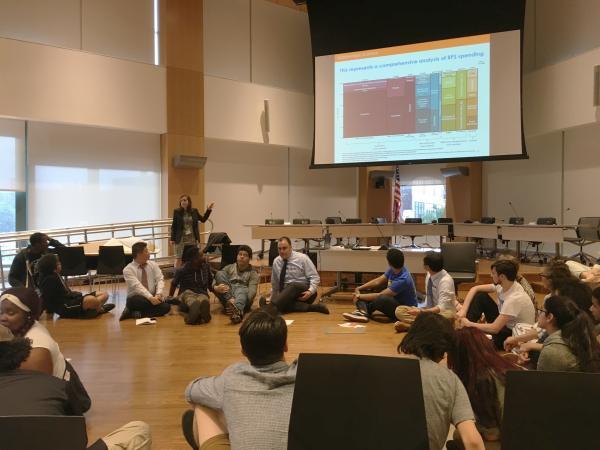June 8, 2016

On Tuesday, the night before the City Council was scheduled to take its first vote on the city budget, which includes $1.027 billion for the public schools, a few dozen students gathered with school officials in the Bruce C. Bolling Building in Roxbury to discuss the mechanisms of the budget process then took control of the meeting from the adults in the room.
After months of heated debate and two high-profile student walkouts to protest possible school cuts, the budget has made its way to the council chambers. On Wednesday, members rejected the budget before them in an initial vote. A final bill must be approved before the start of the next fiscal year on July 1.
As it stands, the school budget is slated for a 1.3 percent increase over last year’s allocation, while the overall budget is planned to increase by 4 percent. BPS spends $1.1 billion, according to chief finance officer Eleanor Laurans, divided into four categories: instructional ($617 million), non-central non-instructional ($211 million), non-central operations and management ($193 million), and central ($78 million).
On Tuesday night, Superintendent Tommy Chang asked students to start out with an improvisational activity to foster collaboration, an introductory exercise where students were asked to use the phrases “no,” “but” and “yes, and” to describe ideal cafeterias. He then asked for feedback, at which point Boston Community Leadership Academy sophomore Fania Joseph stepped in with an icebreaker of her own.
“Stand up if you felt patronized by this activity,” she said.
The students stood, asserting that they did not want to spend time on games. They wanted to talk about the specifics of education funding, but after an hour of disagreeing about the purpose of the meeting or the usefulness of exercises prepared jointly by students and school department officials before the forum, the students sent the adults out of the room.
After 15 minutes of conferring among themselves, the students asked the officials to come back in. Instead of convening around small tables set up for the meeting, the students sat in a circle on the hardwood floor. Chang and school finance officials sat with them, answering their questions for the remaining 40 minutes until just past 8 p.m.
The students raised concerns touching on charter schools, building new schools versus repairing old facilities, and closures, an issue related to a controversial assessment report on school facilities that suggested looking at closing 30 to 50 school buildings.
One student, citing the report, asked how school closings would be determined. “This is my first year as superintendent of Boston Public Schools. I’ve said from the very beginning, we’re not going to close any schools,” Chang told the students.
In response to a question about the mechanics of school closures, Chang said, “If that’s even a possibility, it can’t be done without a transparent process. We have to understand why, we have to get feedback, and then sometimes hard decisions do have to be made.”
BPS creates its budget based on a weighted formula, after which the school committee votes on the allocations. The city council then holds a series of hearings on the annual budget. Yesterday (June 8) was the council’s first scheduled vote on the new budget and it unanimously set aside the bill for further review and a later vote.
Councillors identified BPS funding as chief among their concerns. Councillor Tito Jackson said the school budget, which leaves a shortfall of about $38 million, was woefully inadequate in providing for the students. “We are at a time in the city of Boston when people are doing better than we’ve ever seen,” Jackson said. If the budget comes back to the council still missing that shortfall, Jackson said he “would ask that we all vote no.” That would revert the budget to last year’s version.
Councillors Ayanna Pressley and Anissa Essaibi George both said more resources needed to be included for student support, including trauma care.
Toward the end of the meeting on Tuesday, the most frustration involved what Excel High School senior Brian Foster saw as the pointlessness of railing against the school department, which, in the end, only distributes approved funding.
“We should be asking the City Council and the mayor,” Foster said. “We can’t really pressure the school department. They’re only given this slice of the pie. At the end of the day, they’re fighting the same war as us,” he said. “We shouldn’t be here, having this conversation. This is like a last resort. Like, we’ve already lost.”
Chang and the other school officials said they had hoped to bring in young people to meetings and forums like this before the budget process moved too far along. “One of the big asks I had of everyone was, ‘Could we have ways to have young people more involved in the budgeting process in the very beginning?’ ” Chang said. “But I’m glad this happened. It was so much more authentic, so much more genuine. I learned a lot just letting you guys take the reins.”
Topics:



